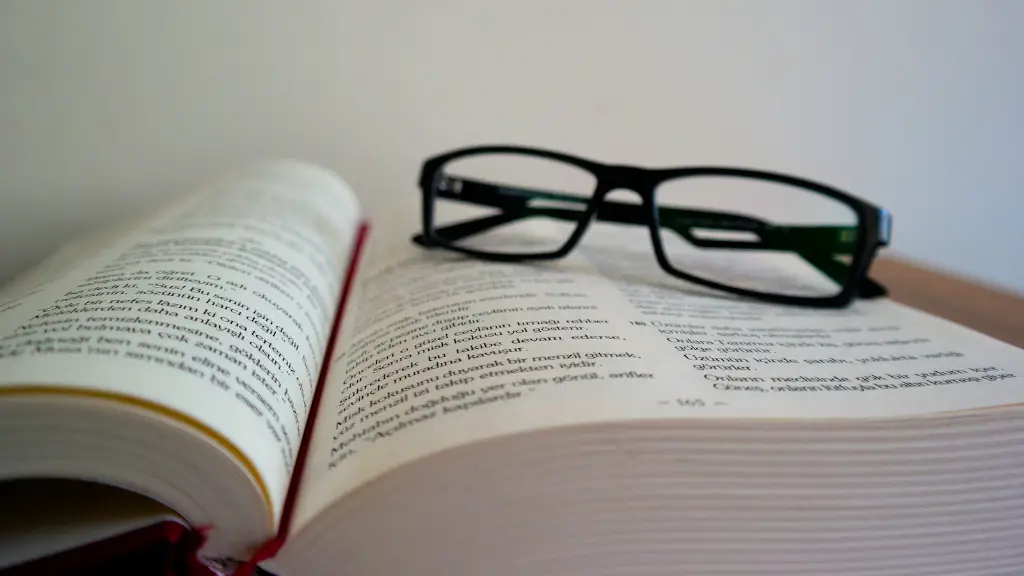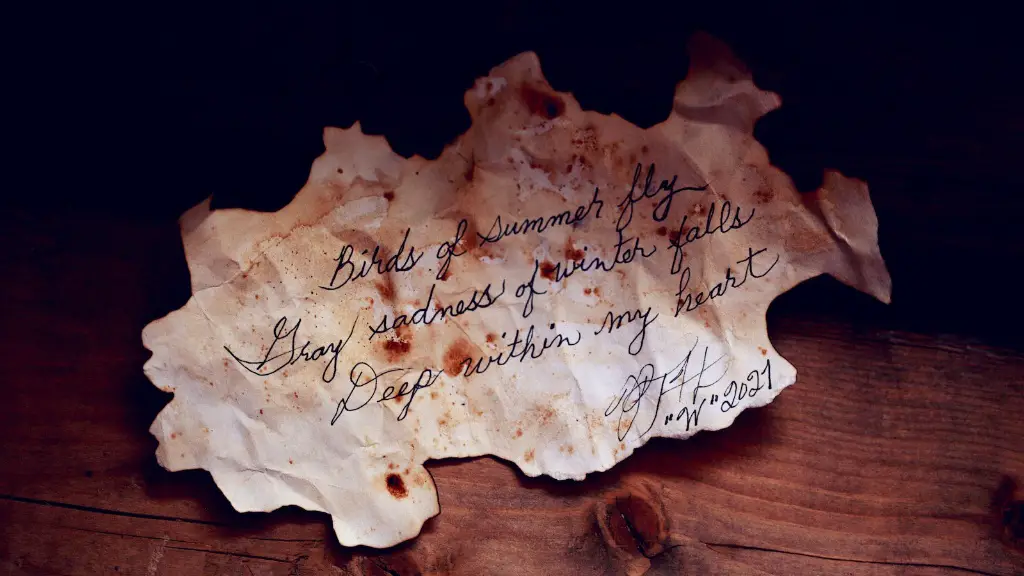Background Information
Lyric and epic poetry are some of the oldest forms of poetic expression, both of which predate written language. As tools of storytelling, they have been used to help transmit cultures and beliefs throughout the history of literature. Both types of poetry are bound to their own literary conventions and techniques, though they have remained staples of literature for generations.
The Basics of Both Types of Poetry
Lyric poetry is focused on communicating personal emotions in a concise, direct manner. Typically expressed through lyrics in songs, lyric poetry often expresses intense emotional qualities such as joy and sorrow. It does not usually tell a story or contain a narrative but rather conveys specific emotions.
Epic poetry, on the other hand, tells a long story that usually revolves around a heroic figure. Epic poetry is usually more elaborate than lyric poetry and often involves impressive, creative descriptions of battles, characters, and other events. Epics can create vivid images and evoke a wide range of emotions.
The Distinguishing Features of Lyric and Epic Poetry
The distinguishing feature of lyric poetry is its brevity and use of expressive language to communicate specific emotions. Lyric poems often employ intricate imagery and metaphor to effectively illustrate a feeling. They are also usually short and may contain a chorus that is repeated in each verse.
Epic poetry, meanwhile, is usually more lengthier and contain a narrative. It is usually told in a series of heroic poem verses that often involve various characters, settings, and stories. Epic poems usually use personification and metaphor to help create more vivid and dynamic descriptions.
Form and Structure of Lyric and Epic Poetry
Lyric poetry often follows a loose form, with lines that are longer or shorter than traditional verse. It can also be structured in different types of stanzas, such as quatrains, tercets and couplets. Lyric poetry typically has fewer than 100 lines of verse, while epic poetry can have hundreds or even thousands of lines.
Epic poetry, meanwhile, often follows a strict rhyme or meter pattern which is repeated throughout the poem. Epic poems typically follow a traditional stanza form, such as couplets or tercets. It is also often structured in a way that builds on earlier verses while adding new verses to the narrative.
Themes and Language Used in Lyric and Epic Poetry
Lyric poetry usually focuses on specific feelings through powerful imagery and creative metaphors. While it can be used to tell a story, lyric poetry is often used to evoke an emotion, share a memory, or simply describe a moment in time.
Epic poetry, on the other hand, often tells a story and focuses on telling it in imaginative, creative ways. It is often used to portray myths, legends, and other heroic stories. Epic poetry often features vivid descriptions and elaborate language in order to build suspense and convey emotion.
The Purpose of Lyric and Epic Poetry
The purpose of lyric poetry is often to convey a specific emotion or memory. It is typically used to express personal thoughts or feelings, with its focus on brevity and imagery making it an effective tool for communicating emotions.
Epic poetry, meanwhile, is often used to tell stories, either of historical events or cultural myths and beliefs. Its length and use of dynamic description help to build suspense and evoke emotions within the readers. Epic poetry can also be used to educate, entertaining, and offer insight into different cultures.
Style and Tone in Lyric and Epic Poetry
Lyric poetry usually employs a direct style of communication, with vivid imagery and creative metaphors used to convey feelings. It often has a dream-like quality, aiming to convey a sense of reflection or contemplation. Lyric poetry also often has a conversational tone, as if it is telling a story between two people.
Epic poetry, meanwhile, is often written in a grandiose style, with strong descriptions and personification used to create vivid images in the reader’s mind. It is usually written with a serious, noble tone, reflecting its heroic nature. Epic poetry is often written in a formal language, with a focus on communicating grand narratives.
The Use of Symbolism in Lyric and Epic Poetry
Symbolism is an important tool of both lyric and epic poetry. In lyric poetry, symbols often reflect personal emotions and memories, helping to convey a sense of understanding and insight into life. In epic poetry, meanwhile, symbols often reflect cultural heroes and self-sacrifice, helping to create the heroic nature of the stories being conveyed.
Audience Engagement in Lyric and Epic Poetry
Lyric poetry often attempts to engage the audience through its direct, personal style of communication. Through its use of vivid imagery and creative metaphors, lyric poetry can often evoke a strong emotional response from the reader.
Epic poetry, meanwhile, attempts to engage the reader through its expansive narrative. Its use of vivid descriptions and elaborate language helps to capture the reader’s imagination and take them on an epic journey. Epic poetry often begins with a sense of grandeur and builds towards an emotionally charged climax.
Rhythm and Meter in Lyric and Epic Poetry
Rhythm and meter are important elements of both lyric and epic poetry. In lyric poetry, rhythm and meter are often used to create a sense of movement and create a gentle rhythm that conveys emotion.
Epic poetry, on the other hand, often uses rhythm and meter to help capture the excitement of a heroic story. It is often written in a iambic pentameter, helping to create a flowing rhythm that reflects the momentum of the story. Epic poetry often creates a sense of grandeur and power through its use of rhythm and meter.


